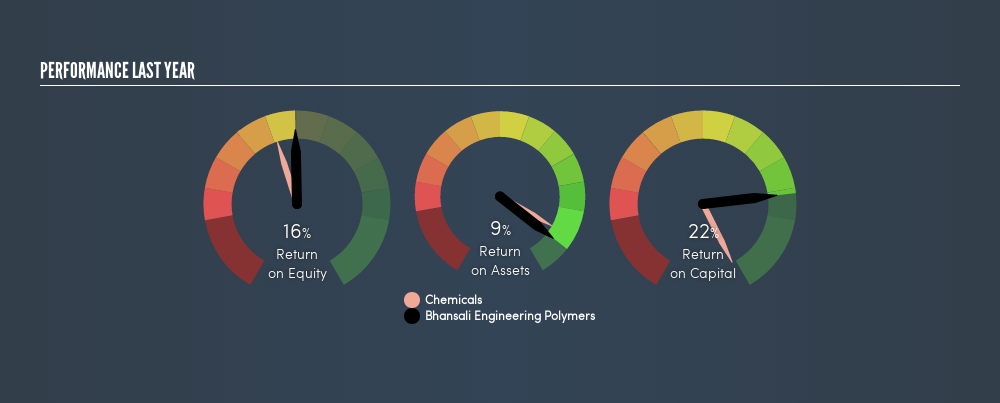Did Bhansali Engineering Polymers Limited (NSE:BEPL) Use Debt To Deliver Its ROE Of 16%?

Want to participate in a short research study? Help shape the future of investing tools and you could win a $250 gift card!
Many investors are still learning about the various metrics that can be useful when analysing a stock. This article is for those who would like to learn about Return On Equity (ROE). By way of learning-by-doing, we'll look at ROE to gain a better understanding of Bhansali Engineering Polymers Limited (NSE:BEPL).
Our data shows Bhansali Engineering Polymers has a return on equity of 16% for the last year. Another way to think of that is that for every ₹1 worth of equity in the company, it was able to earn ₹0.16.
View our latest analysis for Bhansali Engineering Polymers
How Do You Calculate ROE?
The formula for return on equity is:
Return on Equity = Net Profit ÷ Shareholders' Equity
Or for Bhansali Engineering Polymers:
16% = ₹472m ÷ ₹3.0b (Based on the trailing twelve months to March 2019.)
Most readers would understand what net profit is, but it’s worth explaining the concept of shareholders’ equity. It is the capital paid in by shareholders, plus any retained earnings. The easiest way to calculate shareholders' equity is to subtract the company's total liabilities from the total assets.
What Does ROE Signify?
Return on Equity measures a company's profitability against the profit it has kept for the business (plus any capital injections). The 'return' is the yearly profit. That means that the higher the ROE, the more profitable the company is. So, all else equal, investors should like a high ROE. That means it can be interesting to compare the ROE of different companies.
Does Bhansali Engineering Polymers Have A Good Return On Equity?
One simple way to determine if a company has a good return on equity is to compare it to the average for its industry. Importantly, this is far from a perfect measure, because companies differ significantly within the same industry classification. The image below shows that Bhansali Engineering Polymers has an ROE that is roughly in line with the Chemicals industry average (13%).

That's neither particularly good, nor bad. ROE tells us about the quality of the business, but it does not give us much of an idea if the share price is cheap. If you are like me, then you will not want to miss this free list of growing companies that insiders are buying.
Why You Should Consider Debt When Looking At ROE
Virtually all companies need money to invest in the business, to grow profits. That cash can come from issuing shares, retained earnings, or debt. In the case of the first and second options, the ROE will reflect this use of cash, for growth. In the latter case, the debt used for growth will improve returns, but won't affect the total equity. In this manner the use of debt will boost ROE, even though the core economics of the business stay the same.
Combining Bhansali Engineering Polymers's Debt And Its 16% Return On Equity
Shareholders will be pleased to learn that Bhansali Engineering Polymers has not one iota of net debt! Its ROE suggests it is a decent business; and the fact it is not leveraging returns indicates it is well worth watching. After all, when a company has a strong balance sheet, it can often find ways to invest in growth, even if it takes some time.
But It's Just One Metric
Return on equity is a useful indicator of the ability of a business to generate profits and return them to shareholders. Companies that can achieve high returns on equity without too much debt are generally of good quality. All else being equal, a higher ROE is better.
Having said that, while ROE is a useful indicator of business quality, you'll have to look at a whole range of factors to determine the right price to buy a stock. It is important to consider other factors, such as future profit growth -- and how much investment is required going forward. Check the past profit growth by Bhansali Engineering Polymers by looking at this visualization of past earnings, revenue and cash flow.
But note: Bhansali Engineering Polymers may not be the best stock to buy. So take a peek at this free list of interesting companies with high ROE and low debt.
We aim to bring you long-term focused research analysis driven by fundamental data. Note that our analysis may not factor in the latest price-sensitive company announcements or qualitative material.
If you spot an error that warrants correction, please contact the editor at editorial-team@simplywallst.com. This article by Simply Wall St is general in nature. It does not constitute a recommendation to buy or sell any stock, and does not take account of your objectives, or your financial situation. Simply Wall St has no position in the stocks mentioned. Thank you for reading.
About NSEI:BEPL
Bhansali Engineering Polymers
Operates a petrochemical company in India and internationally.
Flawless balance sheet established dividend payer.
Similar Companies
Market Insights
Community Narratives



